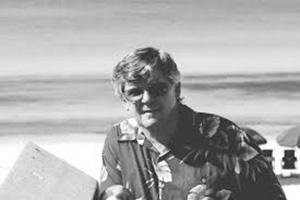By Hardy Jackson
A couple of weeks ago I went to my local seafood shop and picked up the box of oysters for a “shucking & slurping at sunset” neighborhood gathering.
The visit sent me roaring down memory lane.
I was a boy when I ate my first raw oyster. It came from Choctawhatchee Bay, not more than 20 miles from where I was buying a box that day.
Back then the bay was at the heart of a fishing-shrimping-oystering culture that is largely gone today.
I got to see it.
I even got to taste it.
All because my father and his brother and three sisters could not get along with each other for long.
Let me explain.
Back in my boyhood it was customary for Jackson siblings to gather at their mother’s on various holidays. There they would enjoy each other’s company until someone dredged up an old grievance (or invented a new one), started an argument and everyone went home mad.
To minimize the volatility, or at least delay the ultimate outcome, the sons and sons-in-law would often go off on an expedition somewhere, thus reducing the possibility that there would be an altercation.
When my grandmother built the beach cottage (1956), it became a holiday gathering place.
However, there was a drawback.
The cottage was small, and crowding only increased the chance of the memory of an ancient slight boiling over into a full-fledged fuss.
So at the coast, the male exodus became even more critical to family serenity.
As a youngster, I did not fully comprehend the significance of the departure of Daddy and the others. I only knew that though I was the oldest of the grandchildren, I was left behind with the women and whatever younger cousins happened to be there.
I yearned for the day when I would be invited to go along.
Which gets me back to oysters.
Remember. This is about oysters.
It was Thanksgiving.
Family members gathered at the coastal cottage.
Soon there was squabbling, and the men headed out on a road trip.
At the door my father turned to 13-year-old-me and asked, “wanna go?”
My mother’s expression told me that though she would rather I said “no;” she was opposed to letting me loose into the world of men. So, with no idea where we were going or what we were going to do, I piled in with them and off we went.
We crossed the bay and turned left at Freeport. That is when I saw them. Strung out along the road, about 100 feet apart, were little stands that looked a lot like Lucy’s psychiatric shop in the “Peanuts” cartoon. In each was a long table with a row of stools on one side.
Our driver, an uncle, pulled over at the first and out we tumbled.
“Ever eaten raw oysters?” the uncle asked me.
I hadn’t.
“Wanna?”
“Sure,” I none-too-convincingly replied.
We each took a stool.
Now I had seen raw oysters before – shell-less and sealed in a jar. Daddy bought them from a seafood peddler who came to our town. Mama made oyster stew. It was not one of my favorites.
Across the table were a couple of boys about my age, expertly shucking and placing the half-shell on the trays in front of us. On the trays were crackers, catsup, horse radish and Tabasco. Nothing else.
Behind the boys were men who presided over washtubs full of iced down soft drinks and beer.
The boys were Freeport High Future Farmers of America who intended to farm the bay, like their daddies. This was their annual fund-raiser – carried out without health certificate, liquor license or customer complaint. Raw capitalism.
Daddy ordered a dozen for each of us.
There comes a time in every boy’s life when he has to man-up or admit that he is still a child. For me, this was one of those times.
Resolved to do what the men did, I watched Daddy put an oyster on a cracker, pile it with seasonings, stuff it in his mouth and chase it with beer.
Then I watched an uncle pick up the shell, tilt it back, and let the unadorned oyster slide in.
I started doing it Daddy’s way. By the end of the evening I was one with my uncle – and with the oyster.
Sadly, the Bay no longer yields its bounty. No FFA stands line the highway.
So I bought a box.
My son, home from college, did the shucking. It is the only marketable skill I ever taught him.
His Mama was proud.
Harvey H. (“Hardy”) Jackson is Professor Emeritus of History at Jacksonville State University. He can be reached at hhjackson43@gmail.com.

